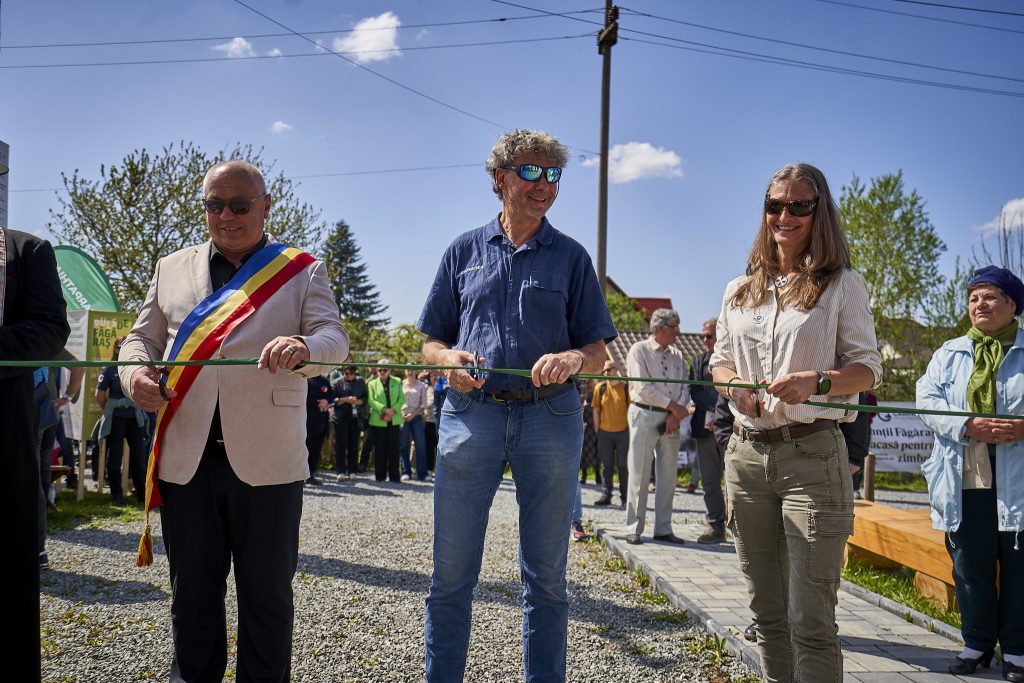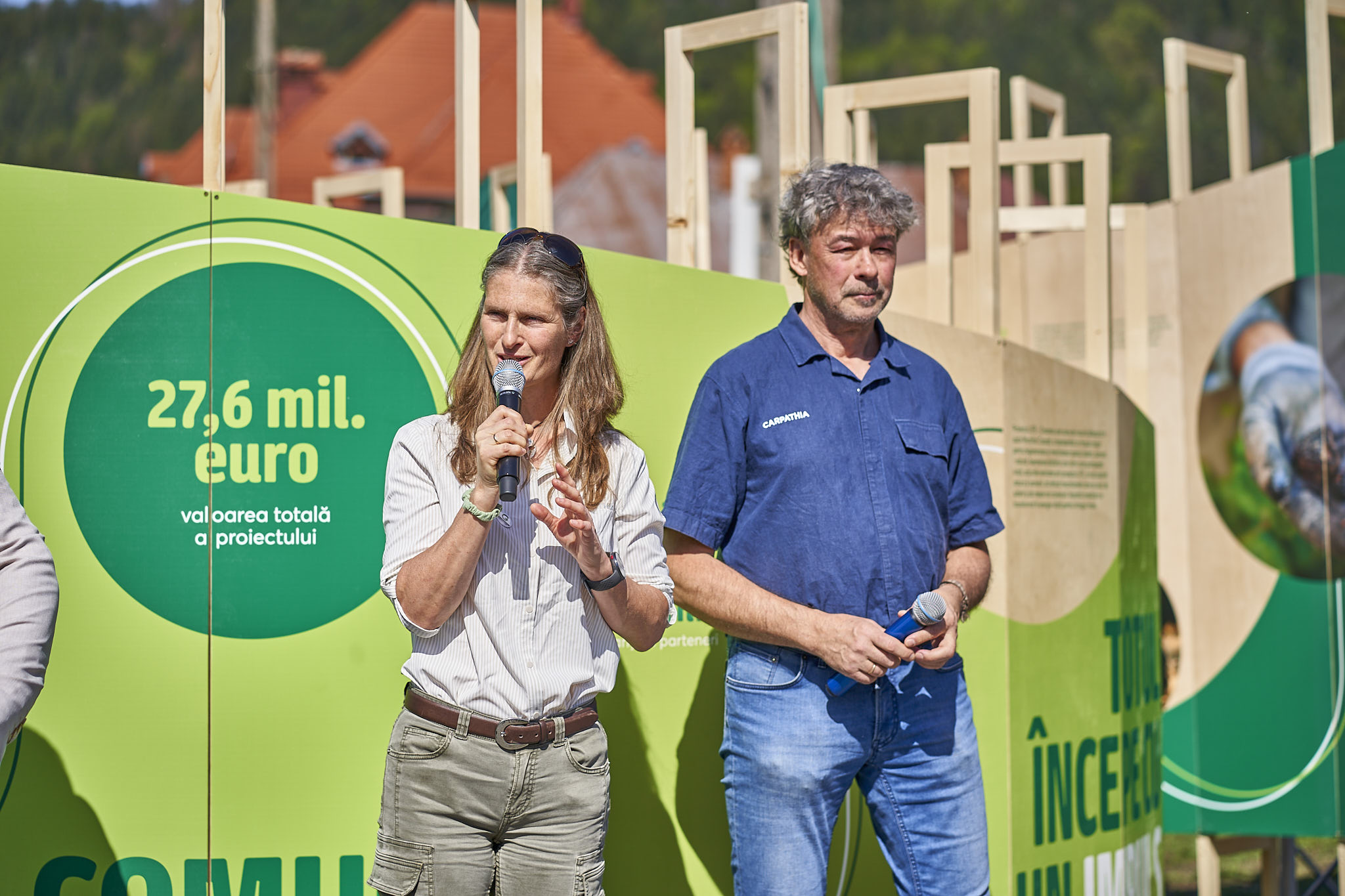We are pleased to announce the successful completion of the largest LIFE project in Romania, ‘Creating a Wild Nature Zone in the Southern Carpathian Mountains, Romania’ (2019-2025), worth 27.6 million Euros, and the launch of the Bison House, the second visitor centre dedicated to protecting the region’s biodiversity. Funded by the European Commission and the Arcadia Foundation, this project has a significant impact on forest conservation, ecological restoration, and species reintroduction, and is an important pillar of sustainable development for local communities.
Conservation and protection of nature
‘Creating a Wild Nature Zone in the Southern Carpathian Mountains, Romania’, a project funded by the European Commission under the programme for environmental projects and climate policies – LIFE Nature, developed by Foundation Conservation Carpathia, alongside six other partners, included actions structured across five main directions: forest conservation, ecological restoration, species reintroduction, communities and communication, education and green business, with an impact on both nature and people.
Through this LIFE project, Foundation Conservation Carpathia contributed to forest conservation by acquiring and including 1,100 hectares of forest in the Catalogue of Virgin and Semi-Virgin Forests, as well as protecting 5,000 hectares of forests and alpine meadows. Correcting past mistakes through ecological restoration actions, which involved reforesting 845 hectares of land with 2.5 million seedlings, creating five nurseries and a greenhouse, and generating over 640,000 seedlings.
Additionally, 18 kilometres of eroded exploitation roads were levelled and planted, 290 hectares of artificial spruce monocultures were improved by planting species characteristic of the area, and over 152 kilometres of valleys were cleared of invasive foreign plants.
In addition to forest conservation measures, the project involved the reintroduction of 82 bison and 62 beavers, species essential for balancing the ecosystem and protecting biodiversity in the Făgăraș Mountains. In this context, Foundation Conservation Carpathia continues to build a sustainable future for nature, with benefits for the entire region.
Within the LIFE project, Foundation Conservation Carpathia laid the foundations for a long-term monitoring and study programme for populations of bears, wolves, lynx, and deer in the southeast of the Făgăraș Mountains, so that management decisions for these species are made on scientific grounds. Additionally, conservation plans were developed for the golden eagle, marmot, and capercaillie.
Coexistence with wildlife based on prevention, intervention, and compensation
Foundation Conservation Carpathia has created a model for human-wildlife coexistence based on prevention – intervention – compensation, over 78,000 hectares (five hunting grounds) in the southeast of the Făgăraș Mountains. To prevent conflicts with wildlife, 63 Carpathian shepherd dogs were donated to farmers in the project area, and over 40 electric fences were installed. To respond promptly when conflicts with wildlife occur, two rapid response teams were created. Compensation measures included the immediate replacement of livestock lost in bear or wolf attacks. As a result, 48 farmers were compensated with 168 sheep and 44 cows, which Foundation Conservation Carpathia raised with a local farmer.
“The LIFE project is an important step in the protection and restoration of mountain ecosystems in the Făgăraș Mountains, a model of collaboration between authorities, organisations, and local communities for nature conservation.” said Barbara and Christoph Promberger, executive directors, Foundation Conservation Carpathia. “Each activity within the project, from the reintroduction of bison and beavers to the creation of eco-tourism infrastructure, aims not only at protecting nature but also supporting and developing the economy of local communities. We are pleased with the impact of this project on the region and continue to work for a sustainable future that brings long-term benefits for nature and the communities that depend on it.”
This LIFE project, the largest of its kind in Romania (2019-2025), had a direct economic impact of 21 million Euros on local communities and a total value of 27.6 million Euros, with the European Commission’s contribution being 9.3 million Euros, and 18.3 million Euros from partner co-financing.
The project was co-financed by the Arcadia Foundation through the ELSP (Endangered Landscapes and Seascapes Programme), a Cambridge Conservation initiative. ‘Creating a Wild Nature Zone in the Southern Carpathian Mountains, Romania’ is the second LIFE project managed by Foundation Conservation Carpathia, the first being carried out between 2012 and 2018, with the goal of ecological restoration of forest and aquatic habitats in the Upper Dâmbovița Valley, Făgăraș Mountains.
Support for communities and green businesses
The LIFE project actively involved 28 communities from four counties: Argeș, Brașov, Sibiu, and Vâlcea. Foundation Conservation Carpathia supported the development of infrastructure for sustainable tourism, including the creation of visitor centres and hiking trails, educational activities, and the development of a sustainable economy with a positive impact on local communities. More than 100 companies from the area were involved in the project, and 100 employees, mostly from local communities, benefitted from employment.
As part of the Roadele Munților initiative, a social enterprise that integrates natural products and services from producers around the Făgăraș Mountains, over 25 farmers and entrepreneurs from the area were connected. Additionally, 30 entrepreneurs received technical assistance, and microgrants worth 30,000 Euros were awarded through the Carpathia Fund, supporting small local producers and the economic development of the region.
A step forward for nature conservation
The LIFE project had a significant impact on nature education, involving over 1,800 students and 69 teachers in environmental protection educational activities. The project also attracted over 16,000 participants to the five editions of the Făgăraș Fest and contributed to the construction of two visitor centres: the Beaver House and the Bison House. This summer, the eco-tourism infrastructure will also include a thematic trail in the commune of Nucșoara, implemented in collaboration with the Romanian Ecotourism Association, which promotes sustainable tourism and environmental education. Foundation Conservation Carpathia continues to promote collaboration between local authorities, NGOs, and communities to ensure a sustainable future for biodiversity in the Făgăraș Mountains.
About the project
This activity is part of the LIFE Carpathia project, ‘Creating a Wild Nature Zone in the Southern Carpathian Mountains, Romania’, LIFE18 NAT/RO/00108. The main goal of the project is the restoration of degraded habitats and the implementation of conservation measures that allow the restoration of natural processes and, at the same time, create benefits for local communities in the Făgăraș Mountains area. The project is being implemented by Foundation Conservation Carpathia, in partnership with the Carpathia Forestry Association, Piatra Craiului Făgăraș Conservation Hunting Association, Carpathia Agro & Finance SRL, Conservation Capital Consulting Ltd., Argeș County Gendarmerie – Basarab I, and ProPark – Foundation for Protected Areas, between 2019-2025, with financial support from the European Commission through the LIFE Nature programme (www.ec.europa.eu) and the Arcadia Foundation through the ELSP programme (Endangered Landscapes and Seascapes Programme, www.endangeredlandscapes.org). The content of this material does not necessarily reflect the official position of the European Union.




